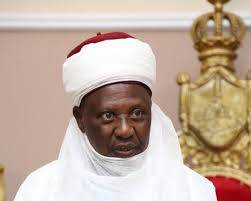by Haliru Sarki Kende
Gwandu, the seat of the western caliphate has marked another milestone in its checkered history that routed from 1804 to 1808. The feat this time around, was the 80th birthday celebration of the 20th Emir, Alhaji (Dr.) Muhammad Iliyasu Bashar CFR, mni.
- Malami: Prominent Nigerians financing terrorism will be prosecuted
NPA debacle: Hadiza Bala-Usman faces panel over N165.3bn ‘unremitted’ funds
The monarch and first modern Military General in the Fulani empire founded by Sheikh Usman bn Fodio 1804 to 1808 was born at Jega town within the domains of Gwandu emirate on the 23rd of April, 1941. He ascended to the caliphate throne on 5th June, 2005 and so far spread peaceful administration in one and a half decades.
Akin to his natural disposition that detested arrogance and undue affluence, the birthday affair was conducted in a low-keyed manner within the Abdullahi Fodio Palace enclave. It was graced by the Council members, the city’s chief imams, few districts and village heads as well as traditional title holders in the emirate.
The occasion which coincided with the weekly homage, paid to the Royal father each Friday, had the community leaders of Igbo, Yoruba, Tuoregs and Tiv extractions at the 80th birthday special prayers.
Gwandu emirate had its first spiritual leader-cum-emir, Mallam Abdullahi bn Fodio from 1808 to 1829. The emirate came into being after the leader of the Fulani Empire, otherwise known, as the 19th Century Sokoto Caliphate, Sheikh Usman bin Fodio, decided to divide it into two portions for easier administration. He bestowed the custodianship of the East to his son, Mallam Muhammadu Bello.
Located in the heartland of the Western Sudan, Gwandu was composed of other emirates to the south and west of the ancient metropolitan city. To the south were the emirates of Bida, Agai, Lapai and Pategi. The rest included Ilorin, Lafiagi, Shonga and Yauri which had a dhima status. The Bitikhogi and Liptako now in the Republics of Niger and Burkina Faso respectively, Birnin Ngaure (Tumkale) Junju, Sayi, Kunari, Torodi and Yaga constituted the emirates to the west.
At the National Council Order of Precedence, Gwandu occupied the 5th position and 3rd place in the North which reaffirmed its epicenter status in the comity of traditional councils of Nigeria today.
Now, let me go back to the emir cum celebrant who held interactions with community leaders and the populace in higher esteem. To say the least, Emir Iliyasu Bashar cherished and viewed such occasions as communication doors between the authorities and the populace, whilst, the former gripped the latter and review over matters affecting the citizenry.
To wit, the Kebbi State Council Chair was disposed to dialogues which motivated all and sundry to have their say on issues of governance.
He acknowledged the turnout of personalities that prayed for his good health as the hallmark for his further contributions to nation building. He also reiterated his earlier appeal to the leaders to love each other with sincerity and the followers to remain as their brothers’ keeper at all time.
Previously known as Gen. M.B. Jega (retired), Emir Iliyasu Bashar admonished leaders to reexamine their spiritual status in the course of official engagements and while socializing with all strata of people. He reaffirmed the facts that leaders will confront some divine questions that will be answered after their earthly sojourn.
His assumption to duty in 2005 was greeted by certain problems that were so dimensional in his domain, the state and nationwide. Apart from his enthusiasm to invigorate the dignity of Abdullahi Fodio Palace coupled with the dwindling education glory Gwandu emirate was known for, his managerial prowess was challenged by the outbreak of polio that affected several wards.
In a two-week tour across the emirate, the new emir met people at their doorsteps and spelt the inherent dangers of poliomyelitis and what became mandatory to parents in other areas of development. He instructed the native rulers and influential people to immediately do the needful as the state authorities and foreign agencies provided adequate polio vaccines along other communicable diseases that wreak havoc in many settlements.
He was the first Royal father in the country to set up an Enlightenment Committee on COVID-19 pandemic as reported by the local media in Kebbi State.
The custodian of the western caliphate, disabused the minds of the cynics over the allegations that the vaccination exercises was to tame women conception and pregnancy. Emir Bashar who separately addressed a mammoth gatherings of people drew their attention to the security of their domains and remain very keen on such issues at all time. He said that the security networking was no longer the responsibility of the state and federal authorities but every law abiding citizen was a stakeholder.
In retrospect, the government had to lead in matters of security, education, health and agriculture, etcetera but the downturn of the national economy was no longer buoyant to meet such demands as attested in several countries across the globe.
Haliru Sarki Kende, a former Chief Press Secretary to Gwandu Emirate Council writes in from Birnin Kebbi.

 Join Daily Trust WhatsApp Community For Quick Access To News and Happenings Around You.
Join Daily Trust WhatsApp Community For Quick Access To News and Happenings Around You.


